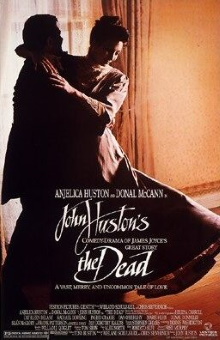I’ve featured a few films by John Huston here already and likely there will be more down the line. This one though was his very last film. It stars his daughter Anjelica Huston and uses a screenplay by his son Tony Huston. It’s an adaptation of short story by James Joyce and it has pretty much no plot at all, which makes it hard to write about. It is of course a masterful work and though I have never read the original story, I can’t imagine a better adaptation than this. Even so it is obvious that this is something that would be better experienced in its original written form rather than as a film.
At the beginning of the 20th-century, three spinsters receive guests in their townhouse in Dublin for dinner on an occasion that is probably today best known as Twelfth Night. One of the three is a music teacher so three of her students are there as well to match with eligible young bachelors. Other guests include Gabriel Conroy, a nephew of the spinster sisters, and his wife Gretta, plus another nephew Freddy Malins who the others worry will spoil the party by being drunk. Gabriel reliably smooths over any problems however and avoids a confrontation from a woman who accuses him of supporting the British domination of Ireland. Meanwhile his wife Gretta mostly interacts with the other guests and seems to get very emotional during some of the performances of singing and poetry. On the whole the evening goes well and even when the conversation gets a little too heated when it comes to politics, they make a collective effort to be merry and avoid argument.
As you can see, the film consists entirely of covering the detailed goings-on in an ordinary dinner party. Apparently it is considered to be a very accurate adaptation of Joyce’s story. There’s an emotional arc in here with Gabriel being the point of view character who comes to realize that his wife has been missing an old lover of hers the whole night due to being reminded of him by the poetry and songs performed. I think that’s a brilliant way to have add dramatic impact to the story but there are plenty of other things going on as well. It also functions as a kind of wake for the most elderly of the spinster sisters. When she stands up to sing, her voice is warbly but Freddy praises her so effusively that it is embarrassing for everyone. But to Gabriel and everyone else, it is a reminder of her frailty and that she is not long for the world, yet nonetheless in his speech at the end of dinner he makes mention of her health and beauty. In the same way, the mood of the dinner party is seemingly merry but the tone of the film itself is dark and morbid.
Personally however I was most interested in this as a kind of documentary about that specific time and place. From big issues like the rise of republicanism and how their discussion of great singers who come to perform in Ireland reveals that the country seems to be culturally falling behind the great cities of the European continent, to small details like how the dinner party also serves to matchmake the spinsters’ young charges and how galoshes made of rubber are appearing or even how a traditional dinner is supposed to play out and what they eat. Even a short talk with a carriage driver who is newly arrived in the city and must be given directions reveals details about the places where they live and the layout of the city. I’m sure that there are many, many more details that I must have missed noticing and it’s all the more remarkable for the fact that Huston is of course American.
As I noted however, while it is pleasant to watch this on the screen the real value still likes in Joyce’s writing and it’s obvious that Gabriel’s monologue at the end must have been lifted straight from the original text. It would make more sense to actually read the original story to get the full, intended effect.
